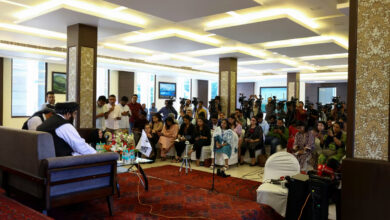
With the 2015 parliamentary elections quickly approaching, many are concerned that female representation at this parliament will be weak. According to the latest statements from the High Elections Commission, there are only 949 women among the 7,416 candidates running.
Within a few days of the closure of parliamentary applicants, the National Council for Women (NCW) submitted 100 women to fill the lists of various parties and alliances, and were surprised to find some lists were completely devoid of female candidates. This was the last straw, according to the council.
The NCW says it places the responsibility on the political parties and alliances for the negligible representation of women in the upcoming parliament, especially considering the demands and aspirations of the Egyptians.
In a press statement on 12 February, the NCW said it has a good reputation and is a well-known entity in Egypt fighting for women's rights. It had already prepared an efficient pool of professionals with experience in volunteering, political and parliamentary work, so it came as an even bigger surprise to realize that many parties had chosen unqualified women to join their list when the NCW had several women who would have been a bigger asset.
Echoing former NCW Secretary General Nehal Abol Qomsan, current Secretary General Mona Omar said that political alliances' ignorance of NCW female candidates today will weaken the representation of women in the next parliament. Omar pointed to the lack of efficiency and professional background some of the candidates on the lists have. She says the criteria for selection of women in these lists do not rely on strong backgrounds, thereby reducing these candidates' chances of a popular vote.
“Generally the country is interested in women’s affairs, but allocating 80 percent for individual seats will put a heavy financial burden on the candidates to campaign, while the 20 percent allocated for the lists will lower women's participation,” Nehad Abol Qomsan, head of the Egyptian Center for Women's Rights, told Egyptian media.
“Women represent 50 percent of the Egyptian society, which means their parliamentary representation should be high,” says Enas Abo Youssef, a journalism professor in the Faculty of Mass Communications at Cairo University.
“It’s not about men and women; it’s about professionalism and efficiencies, as there are many professional women and experts who should be represented in the parliament,” added Youssef.
Looking at the situation from a different perspective, Mona Abdel Rady, the National Front for Egypt's Women co-founder and media official said she felt satisfied with the indices of female participation in this parliament. Abdel Rady said she was satisfied with the number of women running in parliament as it is. "This is due to female optimism after the revolutions, but I am not reassured by the elections process itself," she said.
"I believe a lot of violations will take place, especially when I can see people from the National Democratic Party are running. Moreover, I can't see any diversity in the political trends, which guarantees multiple choices for voters, and it's likely someone is running against himself, which is absurd," said Abdel Rady.
Earlier this month, the "For You and For Us" campaign launched by a number of people concerned with women's issues in Egypt aimed to raise women’s representation in the parliament in both the individual seats and on party lists.
Abol Qomsan said the campaign was just not designed to increase the representation of women in the next parliament, but it began and will continue to work towards a legislative framework that will ensure the fair and adequate representation of women in both this parliament and all upcoming ones.
Female representation in the parliament following the revolution plummeted to 2 percent, compared to 12 percent in 2010. The female quota, which was applied during Mubark’s regime was then cancelled, according to an article published by women's affairs expert Naglaa Mekawy.
She pointed out that in 2012 women won only eight seats out of 498 in the Egyptian parliament. Three were later appointed. Four of them were affiliated to the For Freedom and Justice Party, the political arm of the Muslim Brotherhood.




